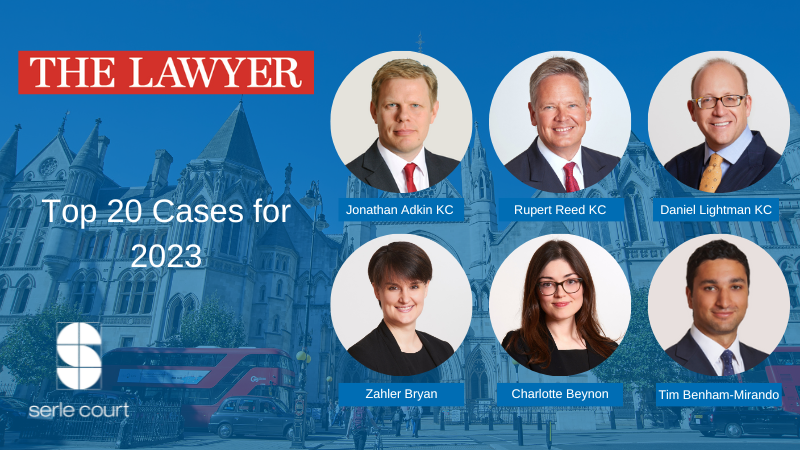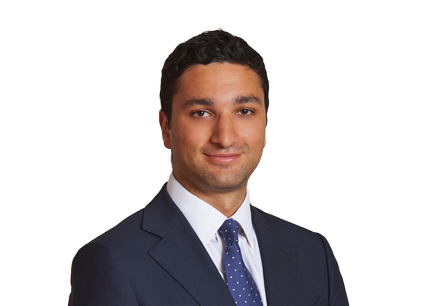6 Serle Court barristers feature in The Lawyer’s Top 20 cases for 2023
Three cases involving 6 members of Serle Court have been featured in The Lawyer's Top 20 cases for 2023, published on 16 January. To read the article in full, become a Litigation Tracker subscriber.
The cases that members of Serle Court are involved in are as follows:
The Republic of Mozambique v Credit Suisse International et al
Jonathan Adkin KC and Zahler Bryan act for the claimant, the Republic of Mozambique with Essex Court Chambers’ Joe Smouha KC, Jeremy Brier KC, Ciaran Keller and Akash Sonecha, Brick Court’s Richard Blakeley, 3VB’s Ryan Ferro, and Twenty Essex’s Edward Gilmore. They are instructed by Peters & Peters partners’ Keith Oliver, Sarah Gabriel and Jason Woodland. A three-month trial will take place in the Commercial Court from October.
Summary of case.
In proceedings worth well over US$2 billion the Republic brings claims in bribery, conspiracy, dishonest assistance, knowing receipt and deceit against entities in the Credit Suisse Group, the Privinvest group and others. These high-profile proceedings concern what has become known as the ‘tuna bond’ or ‘hidden debt’ scandal: the alleged enormous international fraud said to have been perpetrated on the Republic to secure its entry into sovereign guarantees purportedly to secure funding for maritime protection and tuna fishing supply contracts. The alleged conspiracy included the payment of over US$136 million in bribes by entities within the Privinvest group to Credit Suisse employees and the Republic’s agents to secure the Republic’s entry into the sovereign guarantees. The loss caused by the conspiracy has had a devastating impact on the Republic, the third poorest nation in the world, and has wider geopolitical implications.
The case is likely to be precedent setting in a number of different respects. The appropriate scope and application of the privilege against self-incrimination, the proper ambit of documents within a party’s control, the impact of confidentiality obligations in a foreign jurisdiction and the impact of sanctions on the VTB parties are all areas where precedent setting decisions are anticipated. Novel points of law have also been raised in relation to the scope and application of section 9 of the Arbitration Act 1996, the meaning and effect of the State Immunity Act 1978 and the law of bribery. A preliminary issue arising in the first category is listed to be heard by the Supreme Court in January 2023.
The trial itself has significance beyond civil procedure and legal precedent. The alleged fraud had a devastating impact on the international community’s willingness to provide essential foreign aid to the Republic. The decision in the case is likely to influence the international community’s approach to providing state aid. Equally, while Credit Suisse has already been subject to well publicized regulatory findings including US$475 million in fines, the English court’s findings will likely shape the approach taken by financial institutions to sovereign lending in the future.
Re BHS Group Ltd (in liquidation)
Daniel Lightman KC, Charlotte Beynon and Tim Benham Mirando act for the Third Respondent, Dominic Chandler, instructed by Olephant Solicitors’ Jan Mugerwa and Will Castledine.
Summary of case:
The proceedings arise out of the collapse of the BHS group of companies, which was once a major presence on the British high street. The BHS group was owned by Sir Philip Green and his family until it was sold to Mr Dominic Chappell, a former bankrupt who is currently serving a prison sentence for tax evasion, for £1 in March 2015.
The joint liquidators of the BHS companies have brought claims against the former directors for alleged wrongful trading and breaches of duty. They are claiming up to £163 million in what is one of the most significant and high-profile pieces of insolvency litigation in recent years and promises to add to the legal landscape on wrongful trading – few cases of which ever reach the trial stage.
Edwin Johnson J has already given an important judgment in favour of the Third Respondent on an interlocutory dispute regarding the scope of the wrongful trading claims and the need for the Applicants to plead and prove causation and loss: see [2022] EWHC 2205 (Ch).
The case is set down for a 6-week High Court trial in a window commencing in October 2023.
Asturion Fondation v AlJawharah bint Ibrahim Abdulaziz AlIbrahim
Rupert Reed KC acts for the defendant, with Wilberforce’s Simon Atkinson and Joe Steadman, instructed by Simmons & Simmons' Partner David Sandy and supervising associates Shaun Clay and Devina Shah.
Summary of case:
Rupert leads the Counsel team acting for Princess Al Jawharah, widow of the late King Fahd of Saudi Arabia, in resisting claims to her £28 million London property, Kenstead Hall, by a Liechtenstein foundation which seeks to invalidate a transfer of the property out of the Foundation in 2011.
That transfer was made by a late Board member of the foundation after the death in 2005 of King Fahd but on written instructions given by him back in 2001. Similar issues arise in related proceedings in other European jurisdictions in respect of the transfer of other properties to the Princess.
The case raises issues as to the interplay of English property law, Liechtenstein foundation law, and core principles of the Saudi law of inheritance. The case has already been up to the Court of Appeal in 2020 on the issue of the Court’s jurisdiction to strike out proceedings where they have been ‘warehoused’ by the Claimant. It now comes up for trial on the central issue of whether the transfer was made with actual or apparent authority.










